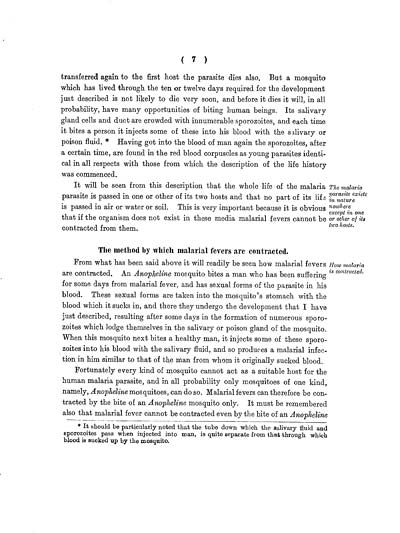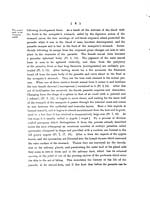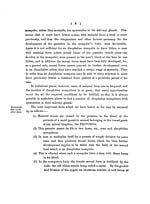Medicine - Disease > Malarial fevers
(13) Page 7
Download files
Individual page:
Thumbnail gallery: Grid view | List view

(7)
transferred again to the first host the parasite dies also. But a mosquito
which has lived through the ten or twelve days required for the development
just described is not likely to die very soon, and before it dies it will, in all
probability, have many opportunities of biting human beings. Its salivary
gland cells and duct are crowded with innumerable sporozoites, and each time
it bites a person it injects some of these into his blood with the salivary or
poison fluid. * Having got into the blood of man again the sporozoites, after
a certain time, are found in the red blood corpuscles as young parasites identi-
cal in all respects with those from which the description of the life history
was commenced.
The malaria
parasite exists
in nature
nowhere
except in one
or other of its
two hosts.
It will be seen from this description that the whole life of the malaria
parasite is passed in one or other of its two hosts and that no part of its life
is passed in air or water or soil. This is very important because it is obvious
that if the organism does not exist in these media malarial fevers cannot be
contracted from them.
The method by which malarial fevers are contracted.
How malaria
is contracted.
From what has been said above it will readily be seen how malarial fevers
are contracted. An Anopheline mosquito bites a man who has been suffering
for some days from malarial fever, and has sexual forms of the parasite in his
blood. These sexual forms are taken into the mosquito's stomach with the
blood which it sucks in, and there they undergo the development that I have
just described, resulting after some days in the formation of numerous sporo-
zoites which lodge themselves in the salivary or poison gland of the mosquito.
When this mosquito next bites a healthy man, it injects some of these sporo-
zoites into his blood with the salivary fluid, and so produces a malarial infec-
tion in him similar to that of the man from whom it originally sucked blood.
Fortunately every kind of mosquito cannot act as a suitable host for the
human malaria parasite, and in all probability only mosquitoes of one kind,
namely, Anopheline mosquitoes, can do so. Malarial fevers can therefore be con-
tracted by the bite of an Anopheline mosquito only. It must be remembered
also that malarial fever cannot be contracted even by the bite of an Anopheline
* It should be particularly noted that the tube down which the salivary fluid and
sporozoites pass when injected into man, is quite separate from that through which
blood is sucked up by the mosquito.
transferred again to the first host the parasite dies also. But a mosquito
which has lived through the ten or twelve days required for the development
just described is not likely to die very soon, and before it dies it will, in all
probability, have many opportunities of biting human beings. Its salivary
gland cells and duct are crowded with innumerable sporozoites, and each time
it bites a person it injects some of these into his blood with the salivary or
poison fluid. * Having got into the blood of man again the sporozoites, after
a certain time, are found in the red blood corpuscles as young parasites identi-
cal in all respects with those from which the description of the life history
was commenced.
The malaria
parasite exists
in nature
nowhere
except in one
or other of its
two hosts.
It will be seen from this description that the whole life of the malaria
parasite is passed in one or other of its two hosts and that no part of its life
is passed in air or water or soil. This is very important because it is obvious
that if the organism does not exist in these media malarial fevers cannot be
contracted from them.
The method by which malarial fevers are contracted.
How malaria
is contracted.
From what has been said above it will readily be seen how malarial fevers
are contracted. An Anopheline mosquito bites a man who has been suffering
for some days from malarial fever, and has sexual forms of the parasite in his
blood. These sexual forms are taken into the mosquito's stomach with the
blood which it sucks in, and there they undergo the development that I have
just described, resulting after some days in the formation of numerous sporo-
zoites which lodge themselves in the salivary or poison gland of the mosquito.
When this mosquito next bites a healthy man, it injects some of these sporo-
zoites into his blood with the salivary fluid, and so produces a malarial infec-
tion in him similar to that of the man from whom it originally sucked blood.
Fortunately every kind of mosquito cannot act as a suitable host for the
human malaria parasite, and in all probability only mosquitoes of one kind,
namely, Anopheline mosquitoes, can do so. Malarial fevers can therefore be con-
tracted by the bite of an Anopheline mosquito only. It must be remembered
also that malarial fever cannot be contracted even by the bite of an Anopheline
* It should be particularly noted that the tube down which the salivary fluid and
sporozoites pass when injected into man, is quite separate from that through which
blood is sucked up by the mosquito.
Set display mode to: Large image | Zoom image | Transcription
Images and transcriptions on this page, including medium image downloads, may be used under the Creative Commons Attribution 4.0 International Licence unless otherwise stated. ![]()
| India Papers > Medicine - Disease > Malarial fevers > (13) Page 7 |
|---|
| Permanent URL | https://digital.nls.uk/74558876 |
|---|




